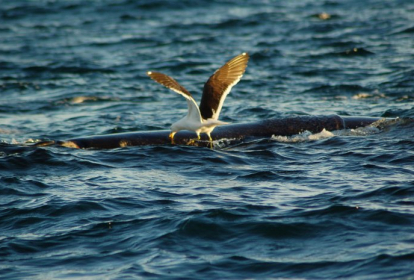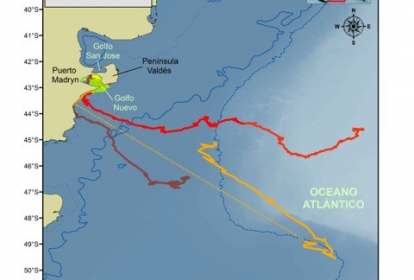Although southern right whales are classified as ‘Least Concern’ by the International Union for Conservation of Nature, the species was severely depleted by the whaling industry and the population’s recovery was delayed by illegal hunting from the 1950s to 1970s.
Some South Atlantic southern right whale populations are reported to be increasing at around seven per cent annually. However, the population in the western South Atlantic, which was estimated at around 4,000 whales in 2010, continues to require prompt and effective conservation action. One of the key concerns for this population is the widespread mortalities of calves. A southern right whale workshop, held by the Commission in 2011, highlighted that 91 per cent of southern right whale deaths since 1971 have been first year whale calves.
The Southwest Atlantic Southern Right Whale CMP was endorsed by the Commission in 2012. Argentina, Brazil, Chile and Uruguay are the range states and signatories to the CMP which is reviewed annually, and subject to a comprehensive evaluation every 3-5 years.
The overall goal of the CMP is to protect habitat for the population and minimise anthropogenic threats to maximise population recovery.
Progress to date
Led by a coordinator and Steering Committee, the CMP has overseen research into population size, status and trends, capacity building to respond effectively to whale entanglements and strandings, satellite telemetry programmes to track and understand behaviour and migration routes, and data sharing efforts. Flexibility is crucial to the CMP which must adapt to shifting baselines due to climate change and emerging offshore industries such as windfarms and fisheries.
Several workshops have been held, including on calf mortality and possible links with kelp gull harassment in the nursery areas, and on identification of sensitive areas in Argentine waters.
Read a press release and full report of the workshop on calf mortality in Peninsula Valdes.
In Brazil, boat-based whale watching has been prohibited since 2015, and a government management plan for whale watching has been developed.
A long-term satellite tagging programme is underway in Argentina and you can read more about it here.
The most recent workshop on the western South Atlantic southern right whale CMP was a general review held in 2022.
Priority work areas
Current priority actions for the CMP include:
- Determining movements, migration routes, and location of feeding ground(s) through satellite telemetry.
- Long-term monitoring of abundance, trends and biological parameters through photo-identification and biopsy sampling.
- Developing a regional entanglement response strategy.
- Developing stranding network capability including standardised approaches to necropsy and sample collection.
- Establishing a GIS database to collate and analyse information on human activities with adverse impacts on western South Atlantic southern right whales.
Read the original proposal for a Conservation Management Plan for right whales in the western Southern Atlantic, endorsed by the Commission in 2012.


